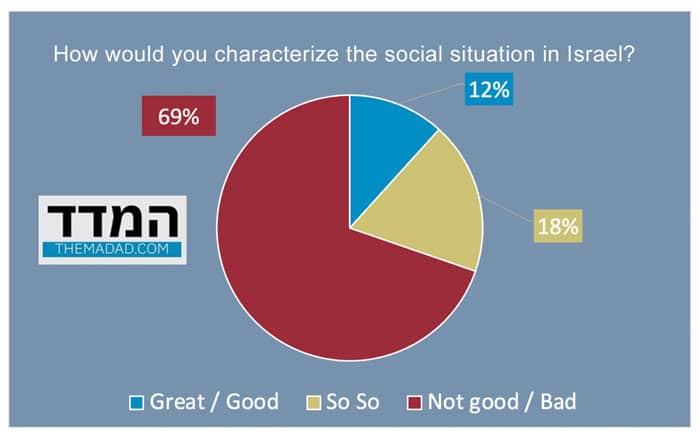 Amir Levy/Getty Images
Amir Levy/Getty Images Anger is a bad adviser. It is also a great motivator.
And Israel is a place where anger can be found in abundance. On Monday afternoon, amid great strife, and a few hours after a possible compromise did not appear, the government passed a new legislation that aims to prevent the courts from reviewing the ‘reasonableness’ of its decisions. One might say: Only a government that intends to be unreasonable would want to take away such ability from the court. One might also say: The legislation itself is the proof of the government’s intention. The first unreasonable act — one that that signals its future intentions —is cancelling the Courts ability to review laws for “reasonableness.”
Fear is a bad adviser. It is also a great motivator.
And half the country is afraid. It is afraid and it also seems determined. Note the dangerous cocktail: an unreasonable government, supported by half the country, faces an angry, terrified, other half. This mens bad advisers all around. And bad writers, as anger and fear are also the enemies of calm analysis, which I must resist on Tuesday morning.
Let us try: 30 years ago, the Supreme Court became more active in applying judicial review to government decisions. Many Israelis, including notable academics and more than a few politicians on both sides, believed that the court was overstepping its boundaries. Calls for moderation, and for altering the ideological makeup of the court multiplied and at some point, the quest to tame the court became a mark of rightwing Israeli ideology.
The question is, naturally, how best to tame the court, and by how much. The other question is who tames the court and what is their motivation. On both counts, the government failed to make its case. It failed to convince the people who generally agree with the need to alter the balance between the court and the legislature, that its actions are measured and well-meaning. It failed to convince a large public that its aim is to somewhat correct a course. In fact, it did the exact opposite. By making grand statements, initiating a rapid process, behaving in triumphant manner, it convinced half the public that its aim is to make Israel “less democratic.” That is, give the government the power to trump basic rights and revolutionize the character of Israel as a Jewish-Democratic State.
Whether this is what the government truly wants to do is a matter of debate. The prime minister, addressing the nation on Monday evening, said no. Alas, after half a year of constant bickering, weekly protests, bad mouthing and propagandizing, the level of trust of the opposition in what the PM says is close to nil. And thus, many Israelis now support what used to be an unthinkable act. They support actions that are going to hurt the country in which they live. They support actions that would harm Israel’s economy. They support the decision of thousands of reservists to quit their military positions. They support all means except for violence as they search for ways to make their voice heard.
Are they being hysterical? This is what government ministers and their supporters believe. They think that their opponents are brainwashed to believe the worse about them. They believe that the true motivation of their opponents is to take down the government. They say – often times with blunt contempt – that their opponents are spoiled, privileged, aristocrats who cannot accept their defeat in elections and cannot accept the idea that new groups are becoming more dominant in Israel’s political-social life. And in some way, there is no doubt that this is the case. Israelis whose principal identity is of Jewish liberal westerners view with horror a coalition that represents an ultra-conservative, ultra-religious worldview.
What comes next? Anger and fear are bad advisers and great motivators, so in a country filled with angry and fearful citizens we must expect the worse. The ‘reasonableness’ law was a first in a long wish list of controversial laws that the coalition intends to pass. Summer break is an opportunity for negotiation, but at least for now, the coalition seems tired and disillusioned of talk, and the PM’s call for a dialogue sounds hollow. Come November, when the Knesset reconvenes for its winter session, the coalition must address the highly charged issue of an ultra-Orthodox draft (as the law expired and a new one must pass), and it intends to address the highly-charged issue of the justices’ process selection.
The government decided to take a huge gamble in passing a bill whose meaning is at best debatable. How symbolic: A government being utterly unreasonable, by canceling reasonableness.
In the meantime, it will have to deal with what currently seems like a big chunk of the country determined to disrupt its policies in whatever ways possible. “What to do now? do nothing! It’s time to bring the country to a halt,” historian Yuval Noah Harari wrote a few hours after the bill had passed. Will a large part of the public follow his advice? The government decided to take a huge gamble in passing a bill whose meaning is at best debatable. How symbolic: An entirely unreasonable government cancels reasonableness.
Something I wrote in Hebrew
The reservists’ moral choice is – and will likely remain – the most dramatic issue Israel faces in the coming weeks. Here’s something I wrote about it:
The discussion about the legitimacy of reservists’ refusal to volunteer rests on the element of astonishment. For 75 years the IDF has kept out of the political debate, supporters of the coalition say. And it is true. But what does it mean? That a tradition is now broken, and a new precedent is set. Those who react to this development with astonishment do not seem to understand the seriousness of the crisis we are in.
A week’s numbers
This is how we feel. No elaboration needed.

A reader’s response:
Robin Elazaroff asks: “Do you really think Biden is a true friend of Israel’s?” My answer: As much as politicians in one country can be “true friends” of other countries, the answer is yes.
Shmuel Rosner is senior political editor. For more analysis of Israeli and international politics, visit Rosner’s Domain at jewishjournal.com/rosnersdomain.























 More news and opinions than at a Shabbat dinner, right in your inbox.
More news and opinions than at a Shabbat dinner, right in your inbox.